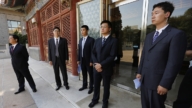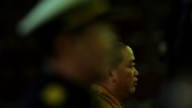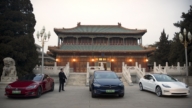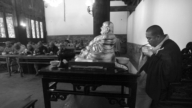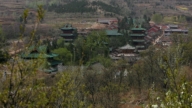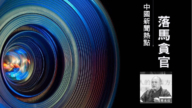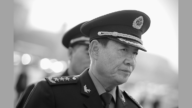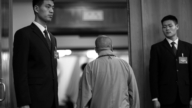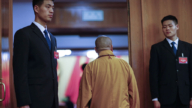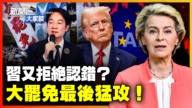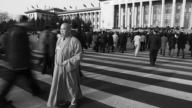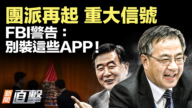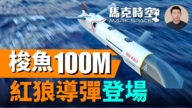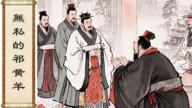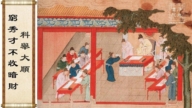【新唐人2012年12月22日讯】中共新领导人习近平,20号在北京会见了前来述职的香港特别行政区行政长官梁振英。评论指称,习近平只是肯定梁的工作态度,没有谈及工作的成绩,与前两任特首的成绩获肯定,大有分别。另外,政治局常委张德江和政治局委员李源潮等陪同会见,外界指出,下一届国务院港澳办的负责人就从他们两人当中产生。请看报导。
据了解,梁振英自今年7月上任以来,就麻烦不断:香港民众揭露梁振英住宅内有非法建筑,而梁振英企图掩盖。之后,有党派呼吁对梁振英进行弹劾。今年早些时候,梁振英挺过了香港立法会的不信任投票。
陪同习近平会见梁振英的有﹕中共中央政治局常委、国务院副总理张德江,和中央政治局委员、国务委员刘延东,以及中央政治局委员李源潮等。
在习近平成为中共最高领导人后,谁接管他分管的港澳工作特别引人注目。
香港作家、自由撰稿人张成觉认为,身为政治局常委的张德江,可能出任中港澳协调小组组长。
香港作家、自由撰稿人张成觉:“ 这不等于说,李源潮对港澳事务就管得少了,因为很可能张德江港澳小组长是挂帅的,但是真正做事情的恐怕还是李源潮。”
香港《苹果日报》指出,张德江可能代替习近平,出任中央港澳协调小组组长,而李源潮则有望成为协调小组副组长,香港《大公报》也持这个观点。
不过,《多维新闻网》表示,李源潮将在2013年3月的人大会议上,成为国家副主席,并依例成为中央港澳工作协调小组组长,主管港澳事务。
《维基百科》指出,2003年,张德江担任广东省委书记期间,隐瞒SARS疫情,对2005年的“太石村罢免村官事件”、“东洲事件”,以及后来的《南方都市报》案等处理手法,备受质疑。而在担任国务院副总理时期,张德江处理2011年“甬温铁路列车追尾事故”中,更是遭受不断批评。
独立评论员李善鉴指出,中共体制是“逆淘汰体制”—-好人留不下。而官员中,只有“稍微开明”或者“稍微保守”的区别。
李善鉴:“只要是说他在这个体制,是这些人,实质上不会有什么根本的变化。任何期望中共的某些个人,能够给香港或者整个国内政治,带来一个开明进步的变化,这些期望最终都会变成失望的。”
习近平在会见梁振英时还说,在中共领导实现新老交替后,还会贯彻香港的“一国两制”政策,而按照《基本法》办事的方针也不会改变。
可是,“一国两制”在香港实施过程,却不断受到质疑。
2003年香港人“反对23条立法”的“七一游行”,有超过50万市民上街参与,迫使特首取消这一条立法﹔今年9月,香港10万人上街,大学生还绝食接力,抗议北京“德育及国民教育科”的计划。香港市民认为,这个计划是中共实施洗脑和政治灌输。最终,香港行政长官做出退让,取消了限期各学校最迟在2015年开办这门课的要求。
专栏政论作家朱健国指出,中共对港澳台的主要运作是靠内部的代理人来做事,也就是内线工作。
专栏政论作家朱建国:“即使是习近平管也是代表江,始终是江在管这个事,包括习近平最终恐怕还是听江的意见,很多内线到现在为止,可能都还是直接由江在处理,他即使交工作,有些内线(工作)他不一定会交出去的。”
日前,香港政府又拟请中共人大常委第5次解释《基本法》。“香港大学法律学院”院长表示,这只会导致“一国两制空间愈来愈小”。
采访/易如 编辑/宋风 后制/周天
Who will be the Next Person in Charge
of Hong Kong and Macao?
On Dec. 20th Xi Jinping new leader of the Chinese
Communist Party (CCP) met Chief Executive of Hong Kong,
Leung Chunying, who came to Beijing to give a report
on his work.
Apparently Xi Jinping only validated
Leung’s work attitude but not his work itself.
That is quite different treatment from
Leung’s two former Chief Executives.
Two members of the Standing Committee of the Political
Bureau, Zhang Dejiang and Li Yuanchao, came to the meeting.
Outsiders felt one of them would be the next person in charge
of the Hong Kong and Macao Affairs Office of the State Council.
Please see the following report.
Xi Jinping met with Leung Chunying,
who came to Beijing to report on his work.
Xi listened to his report on the current situation
in Hong Kong and the special administrative regions.
Since he took office in July this year,
Leung Chunying continued to run into trouble;
Hong Kong people exposed that there are illegal constructions
at the Leung’s resident, which he tried to cover up.
After that, parties appealed to impeach Leung Chunying.
Earlier this year, Leung Chunying survived a no-confidence
vote from the Legislative Council of Hong Kong.
Xi Jinping met Leung Chunying, with two members of the
Standing Committee of the Political Bureau of the CCP there.
They were Zhang Dejiang, Li Yuanchao,
and State Councilor Liu Yandong.
When Xi Jinping became CCP leader, the question of who
will be in charge of Hong Kong and Macao attracted attention.
Hong Kong freelance writer Zhang Chengjue thinks that
Li Yuanchao might be the one who in charge of the affairs of Hong Kong and Macao.
Hong Kong freelance writer Zhang Chengjue: ”It does not
really mean that Li Yuanchao will have less responsibility.
It is probably that Zhang Dejiang would be the figure head,
but Li would take care the affairs of Hong Kong and Macao.”
Hong Kong’s Apple Daily pointed out that Zhang Dejiang may
replace Xi Jinping to serve as head of the Central Coordination
Group in Hong Kong and Macao, but Li Yuanchao is expected
to become the deputy head of the Coordination Group.
Hong Kong Ta Kung Pao also holds this view.
However, “Multidimensional News" stated Li Yuanchao will
become vice president and head of the Central Coordination
Group in charge of Hong Kong and Macao affairs during the
National People’s Congress meeting in March 2013.
Wikipedia information says that in 2003, Zhang Dejiang
served as secretary of the Guangdong Provincial.
He concealed the SARS epidemic. His handling of
Taishi dismissed the village official incident in 2005.
The “Dongzhou event", and later “Nan fang Dushi Bao"
case was questionable.
When serving as Vice-Premier of the State Council, Zhang
Dejiang’s handling of 2011 Ningbo-Wenzhou Railway train rear-end accident met with constant criticism.
Independent commentator Li Shan Jian: ”The CCP system
is a reverse elimination system, so good people have to leave.
Among officials, they can be classified into two groups,
slightly liberal or slightly conservative.”
Li Shanjian: “As long as it is in this system and
with the same people, there will be no fundamental change.
If you have an expectation that someone in the CCP will bring
any enlightened and progressive change to Hong Kong or
the entire country, you will be very disappointed at the end.”
Xi Jinping also told Leung that after the change of power
within the Party, Hong Kong will follow the policy of
“one country, two system”, and there will be no change
in the principle of acting in accordance with the Basic Law.
The principle of “one country, two systems" in Hong Kong is
still questioned during the implementation process.
In 2003, Hong Kong people had the march “against the 23
legislative" more than 500,000 people took to the streets.
They participated in forcing the Chief Executive
to cancel a legislative.
In September 2012, 10 million people took to the streets
and college students went on a hunger strike relay protest.
This forced cancellation of the “Moral and citizen education"
program.
Hong Kong people believe that this plan is the CCP’s
implementation of brainwashing and political indoctrination.
Finally the Chief Executive of Hong Kong agreed to cancel
the deadline for schools to offer the CCP version in 2015.
Political commentary writer Zhu Jianguo said the CCP’s main
operation in Hong Kong, Macao, and Taiwan uses internal agents.
They carry out instructions making it an inside job.
Political commentary writer Zhu Jianguo:
“Even Xi Jinping is a representative of Jiang, and most afraid to hear Jiang’s opinion.
A lot of inside jobs are probably directed by Jiang.
Even though, he is supposed to be hands off on everything,
he just may not be willing to do so.”
Recently, the Hong Kong government intended to invite
members of the Standing Committee to interpret “The Basic Law”.
This would be for the 5th time.
The Dean of the Faculty of Law of University of Hong Kong
said it will be a smaller space within" one country, two systems.”


